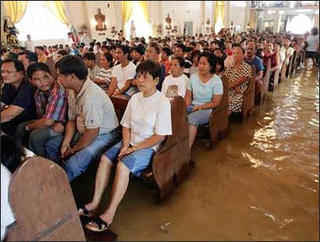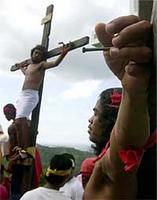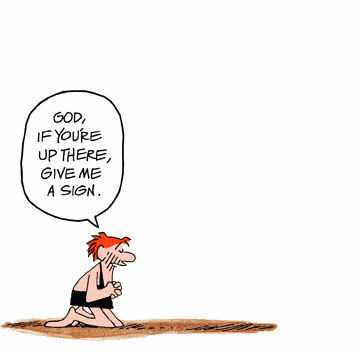Filipinos and Calamities
 My friends and I were watching a CNN Report on the destruction wrought by Hurricane Katrina to citizens of New Orleans, Louisianna. We were so surprised when we saw people screaming and getting all hyterical because their food supplies have not arrived on time. One colored woman said: "We are dying in here!" Another said: "People are getting desperate. They do anything just to survive."
My friends and I were watching a CNN Report on the destruction wrought by Hurricane Katrina to citizens of New Orleans, Louisianna. We were so surprised when we saw people screaming and getting all hyterical because their food supplies have not arrived on time. One colored woman said: "We are dying in here!" Another said: "People are getting desperate. They do anything just to survive."We were surprised not because of the desperate situation of the victims, knowing that they live in the world"s most prosperous nation, but their reaction to the calamity that befell them and the seemingly slow delivery of basic services. (I don't want to downplay what they are experiencing. I know that lives have been lost and are being lost until this moment). Our reaction was coming from an insider to calamities. In a country where typhoons, earthquakes, flash floods, volcanic eruptions are very ordinary as they are experienced several times all year round, disasters become as common as rain.
Getting used to all sorts of disasters (whether natural or man-made) is
 like second-nature to Filipinos. In almost all disasters in the world, one or two Filipinos would be amo casualties (Twin Towers, Madrid and London bombings, sunk shipsng the and crashed planes, etc.). Foreigners are puzzled when they
like second-nature to Filipinos. In almost all disasters in the world, one or two Filipinos would be amo casualties (Twin Towers, Madrid and London bombings, sunk shipsng the and crashed planes, etc.). Foreigners are puzzled when they  see a scavenging family, living inside a wooden cart, laugh and smile at strangers. It is only in this country where children and adults wave at reporters even when water has submerged their homes and destoyed their crops. I guess too much suffering has a desensitizing effect into it: the more you have it, the less you feel it.
see a scavenging family, living inside a wooden cart, laugh and smile at strangers. It is only in this country where children and adults wave at reporters even when water has submerged their homes and destoyed their crops. I guess too much suffering has a desensitizing effect into it: the more you have it, the less you feel it.But also, we have learned to be modest with our expectations of our government leaders. We have learned to temper our wish-list. When disasters strike we do not really expect that they would go all the way to rescue us and give us aid (unless of course when it's election time or when it is televised). But not all Filipino officials are like this, there are some who possess a genuine heart for the poor, but they are very few and far in between.
 Third reason why we put a straight face against disasters is the very religious nature of Filipinos. People leave their homes invoking God for protection. Jeepneys, buses and taxis have a picture or two of the Child Jesus or Mary. Bridges and overpasses would have sayings like: Trust God. Pray. It helps! In all awarding ceremonies from movies to music, winners offer their trophies and thank God for their victories. We really are a people of faith. And this is what I think strengthens us in the face of the most horrible catastrophes. God is our sure help. He never fails. And we trust in Him.
Third reason why we put a straight face against disasters is the very religious nature of Filipinos. People leave their homes invoking God for protection. Jeepneys, buses and taxis have a picture or two of the Child Jesus or Mary. Bridges and overpasses would have sayings like: Trust God. Pray. It helps! In all awarding ceremonies from movies to music, winners offer their trophies and thank God for their victories. We really are a people of faith. And this is what I think strengthens us in the face of the most horrible catastrophes. God is our sure help. He never fails. And we trust in Him.



1 Comments:
At 6:01 PM, Anonymous said…
Anonymous said…
QuiteATake.com: Discovering Alec Guinness - the author
A curious thing happened to me maybe a couple of months ago. I had started reading Alec Guinness's A Positively Final Appearance .
Awesome Blog! I added you to my bookmarks. Feel free to check out this cool hip hop site/blog, my boys run it!
Post a Comment
<< Home